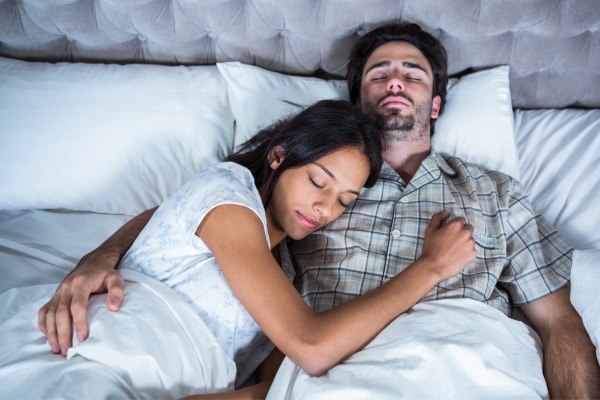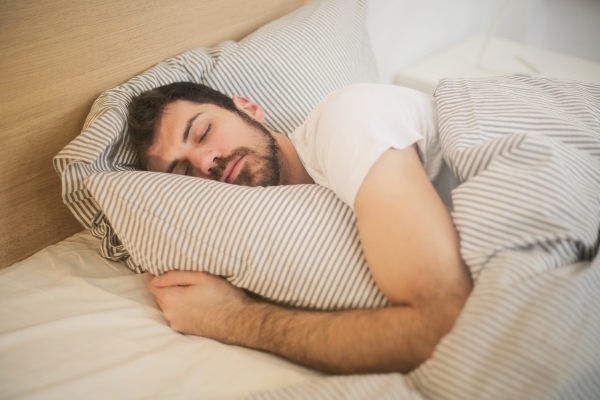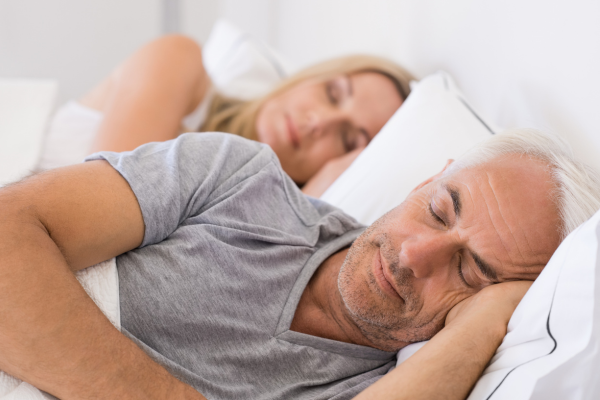Think men are the sleepless warriors, powering through life with fewer hours of rest?
You’ve been sold a lie.
For years, we’ve been told that men don’t need as much sleep as women—that they can function on less, that they’re biologically wired to be more resilient against fatigue.
But what if this isn’t true?
What if this widespread belief is just another outdated stereotype, bolstered by flawed research and societal expectations?
It’s time to dig deeper.
In this post, we’re challenging the myth and exploring the science to uncover whether men actually need less sleep than women—or if this is just another sleep lie we’ve been conditioned to believe.

Biological Sleep Needs – Men vs. Women
When it comes to sleep, our needs aren’t dictated by gender as much as by a combination of factors like age, lifestyle, and overall health.
While it’s tempting to simplify things and say men need less sleep than women, the truth is far more nuanced.
Everyone’s sleep requirements can vary widely depending on their unique circumstances, not their gender alone.
Understanding Sleep Needs
Sleep is a complex biological process influenced by various factors.
Age plays a significant role—children and teenagers need more sleep as their bodies, brains, and memories develop, while adults generally require 7-9 hours for optimal health.
Lifestyle choices, such as diet, exercise, stress levels, and exposure to light, also significantly impact how much sleep a person needs.
Health conditions, like chronic pain or mental health disorders, can increase or decrease the body’s demand for sleep, regardless of whether you’re a man or a woman.
Hormonal Differences
Where things do get interesting is in the hormonal differences between men and women, which can influence sleep quality and duration.
For instance, estrogen and progesterone—hormones that fluctuate during the menstrual cycle, pregnancy, and menopause—are known to affect sleep in women.
High estrogen levels, for example, are linked to lighter, more disrupted sleep, while progesterone has a sedative effect that can promote sleepiness.
Men, on the other hand, are affected by testosterone levels, which also play a role in sleep regulation.
Testosterone levels naturally rise during sleep, particularly during deep, restorative sleep stages.
Research shows that lower testosterone levels, which can happen with age or certain health conditions, are associated with poorer sleep quality in men.
However, these hormonal differences don’t necessarily mean that men need less sleep—they just affect the quality and nature of sleep differently for each gender.
Research Insights
So, what does the science say about whether men truly need less sleep than women?
Studies on this topic reveal a mixed picture.
Some research suggests that women may actually need slightly more sleep than men due to the increased likelihood of sleep disturbances caused by hormonal fluctuations.
One study found that women generally have a longer sleep duration and spend more time in slow-wave sleep—the deepest, most restorative sleep stage—compared to men.
However, other studies indicate that men and women have similar overall sleep needs, with a difference of 11 minutes favoring women.
Individual variations being far more significant than any gender-based difference.
The National Sleep Foundation states that, while women are more likely to experience insomnia and other sleep disorders, these issues are more closely related to hormonal changes, lifestyle, and mental health factors rather than an inherent difference in sleep requirement. [1] [2]
Do Men Need Less Sleep?
In short, there’s no definitive answer proving that men need less sleep than women.
Instead, the evidence suggests that while hormones and other biological factors can influence sleep quality and patterns differently in men and women, sleep needs are primarily individual and not solely determined by gender. [1] [2]

Practical Takeaways for Better Sleep
Regardless of gender, the fundamentals of good sleep hygiene are universal.
Here are some practical, evidence-based strategies that both men and women can use to enhance sleep quality and wake up feeling refreshed.
By making these adjustments, both men and women can significantly improve their sleep quality and enjoy better health and well-being as a result.
Remember, quality sleep is not a luxury—it’s a necessity, no matter who you are.
Stick to a Consistent Sleep Schedule
Establishing a regular sleep routine is key, as our bodies respond best to consistency, making it a powerful tool for improving sleep quality.
Going to bed and waking up at the same time every day, even on weekends, helps regulate your body’s circadian rhythm—the internal clock that tells you when to feel awake and when to feel sleepy.
Disruptions to this schedule, like sleeping in on weekends or staying up late, can lead to “social jetlag,” making it harder to adjust during the week and affecting your overall sleep quality.
Consistency reinforces your natural sleep-wake cycle, making it easier to fall asleep quickly and wake up feeling refreshed.
Practice Relaxation Techniques
Stress is a common enemy of sleep, but incorporating relaxation techniques into your nightly routine can help calm your mind and body.
Practicing deep breathing techniques, like the 4-7-8 method, helps calm your heart rate and encourages a state of relaxation.
Meditation, especially mindfulness meditation, has been shown to reduce anxiety and improve sleep quality.
Progressive muscle relaxation, which involves tensing and then releasing each muscle group, can help release physical tension and signal to your body that it’s time to wind down.
These techniques are simple yet powerful tools for setting the stage for better sleep.
Limit Stimulants
Stimulants like caffeine and nicotine are notorious sleep disruptors.
Caffeine, found in coffee, tea, energy drinks, and even chocolate, can stay in your system for up to 8 hours, making it harder to fall asleep or stay asleep.
Nicotine, a stimulant found in cigarettes and some e-cigarettes, can also interfere with sleep, causing lighter sleep and frequent wake-ups.
Large, heavy meals, especially those high in fat or spice, can cause indigestion or acid reflux, further disturbing your sleep.
To promote restful sleep, avoid these stimulants at least 4-6 hours before bedtime.
Exercise Regularly
Regular physical activity is one of the most effective ways to improve both the quality and duration of your sleep.
Exercise helps regulate your circadian rhythm, reduces symptoms of insomnia, and promotes deeper, more restorative sleep.
Strive to get in at least 30 minutes of moderate activity like walking briskly, cycling, or swimming several days a week.
However, intense workouts close to bedtime can have the opposite effect, raising your heart rate and adrenaline levels, which may make it harder to wind down.
For optimal results, try to finish any vigorous exercise at least a few hours before you plan to sleep.

Mind Your Diet
What you eat can have a direct impact on how well you sleep.
A balanced diet rich in whole grains, lean proteins, and healthy fats supports your overall health and, by extension, your sleep.
Certain nutrients, such as magnesium, found in leafy greens, nuts, and seeds, can promote relaxation and muscle function, while tryptophan, an amino acid found in turkey, chicken, and dairy, helps your body produce serotonin and melatonin—key hormones for sleep regulation.
Avoid heavy, spicy, or sugary meals close to bedtime, as these can cause discomfort and disrupt your sleep.
Manage Stress
Stress and anxiety are leading causes of sleep problems, from difficulty falling asleep to frequent nighttime awakenings.
Finding ways to manage stress can significantly improve your sleep quality.
Practices like yoga and tai chi combine physical movement with mindfulness, helping to lower stress hormones and relax the body.
Mindfulness practices, like meditation and deep breathing, can help quiet the mind, making it easier to drift off.
Even simple activities like journaling before bed can help you process your thoughts and worries, clearing your mind for sleep.
Optimize Your Sleep Space
Your bedroom should be an environment that promotes rest and relaxation.
Keep your room cool, ideally between 60-67°F (15-19°C), as a cooler temperature is conducive to sleep.
Darkness is also crucial—light exposure can disrupt your circadian rhythm, signaling to your brain that it’s time to wake up.
Invest in blackout curtains or an eye mask to keep out unwanted light.
If noise is an issue, consider using earplugs or a white noise machine to create a more peaceful atmosphere.
A clutter-free, calming space can also signal to your brain that your bedroom is a place for rest, not stress.
Invest in a Good Mattress and Pillows
The foundation of good sleep is a comfortable, supportive mattress and pillows.
The right mattress should support your body’s natural alignment and reduce pressure points, minimizing any aches and pains that could disrupt your sleep.
Pillows should support your head and neck, aligned with your spine.
Remember that mattresses and pillows wear out over time—replace them regularly (every 7-10 years for mattresses and 1-2 years for pillows) to maintain comfort and hygiene.
A good bedding setup is not just a luxury—it’s an investment in your health.
Limit Screen Time Before Bed
Blue light emitted from screens on phones, tablets, and computers can interfere with melatonin production, the hormone that regulates sleep.
This can trick your brain into thinking it’s still daytime, making it harder to wind down.
To counter this, turn off all screens at least an hour before bed, and consider using blue light filters on your devices in the evening.
Instead, opt for calming pre-sleep activities like reading a book, taking a warm bath, or listening to soothing music.
These habits can help your body transition smoothly into sleep mode.
These practical steps can significantly improve your sleep quality, allowing you to wake up feeling more refreshed and energized.
Remember, sleep isn’t just about how long you rest—it’s about creating a consistent, healthy routine that supports your body’s natural rhythms.

Try Sleep Revive for Better Sleep
The myth that men need less sleep than women is just that—a myth.
Sleep needs are highly individual and influenced more by factors like age, lifestyle, and health than by gender.
Quality sleep is essential for everyone, and adopting good sleep habits can make a big difference in how you feel each day.
Struggling with restless nights?
Sleep Revive is a natural sleep support supplement designed to help you relax, unwind, and enjoy deeper, more refreshing sleep.
- Rutaecarpine: Helps reduce caffeine’s effects for a quicker wind-down.
- Lemon Balm Extract: Eases anxiety and promotes relaxation.
- L-Theanine: Reduces stress and supports calm without drowsiness.
- Valerian Root: Acts as a natural sedative for faster, deeper sleep.
- Magnesium: Calms the nervous system and supports healthy sleep patterns.
Wake up energized and ready to take on the day. Try Sleep Revive today and reclaim your restful nights!
References
Clinical Medicine & Research
Fatima Y, Doi SA, Najman JM, Mamun AA. Exploring Gender Difference in Sleep Quality of Young Adults: Findings from a Large Population Study. Clin Med Res. 2016 Dec;14(3-4):138-144. doi: 10.3121/cmr.2016.1338. PMID: 28188139; PMCID: PMC5302457.

